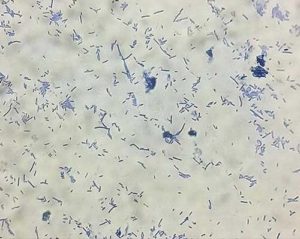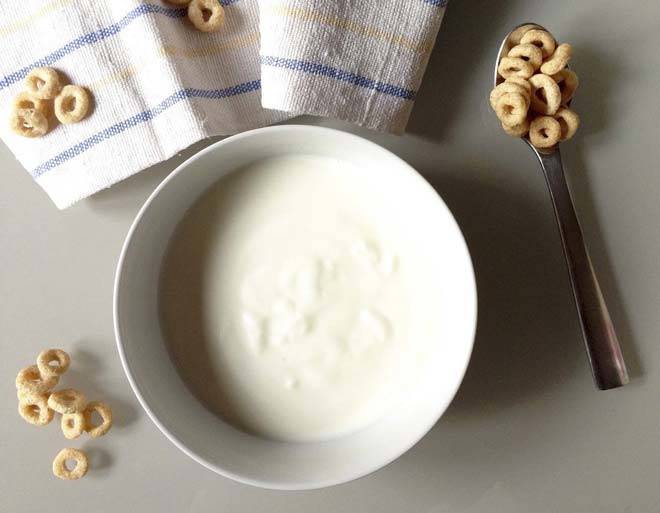When our gut is unhealthy, this can cause unpleasant symptoms such as gas, stomach pain, diarrhea, bloating and much more. Most of our immunity is located in our gut, so gut imbalances have been linked to some autoimmune diseases, hormonal imbalances, diabetes, chronic fatigue, fibromyalgia, depression, anxiety, rosacea, eczema, and more chronic health issues.
The gut is a gateway to our overall health and yogurt and wine can help a great deal with our intestinal health and our wellbeing.
Continue reading to find out more about healing an unhealthy gut with wine and yogurt and what more health benefits these two have to offer to our bodies:
What is Gut Bacteria?
Scientists have been studying the link between the bacteria in our gut and every disease that ails us, saying there’s a strong connection between the two.
Bacteria, along with fungi and viruses live everywhere in our bodies, on our skin, inside our mouths, our noses, our genitalia, our intestines and our urinary tracts. Together they form the microbiome, our body’s unique collection of microbes which is partly genetic and partly determined by our lifestyle.
Bacteria are the most abundant microbes in our intestines and they represent the primary focus of today’s scientists. They help us digest food, line our intestines, and during the process of digestion, they make vital vitamins, also sending signals to our immunity and making molecules which assure the proper functioning of our brain.
Studies have suggested that it is not the absence or the presence of a particular type of bacteria that makes our microbiome healthy. It’s all about the diversity of the bacteria from our gut.
Microbiome related studies are still too new and poor to be able to reveal whether one type of bacteria can cause disease or whether disease might be bread by that particular type of bacteria. All that scientists have accomplished by now is being able to distinguish a link between a person’s bacterial makeup and the presence of a particular disease.
Research has shown some links between bacteria and colon cancer, ulcerative colitis, obesity, diabetes and Crohn’s disease. All these conditions appear to be related to the metabolism and the intestinal condition. Gut bacteria has been linked to health issues related to the whole body.
Some bacteria have the ability to strengthen the immunity, while others will promote inflammation which causes many diseases of the lungs, skin, joints and tissues. It has been proven that a bacterial imbalance will lead to an elevated level of inflammation which can promote the development of the disease.
Scientists have also discovered some strong connections between intestinal bacteria and depression, anxiety, ADD, obsessive-compulsive disorder, autism, and Alzheimer’s disease. This suggests that intestinal bacteria have the ability to influence the functioning of the brain.
Signs of an Unhealthy Gut and Healing Advice
The signs you have an unhealthy gut include the following:
- Digestive problems such as gas, diarrhea or bloating
- Food sensitivities or allergies
- Depression and anxiety
- Irritability and mood swings
- Skin issues such as rosacea and eczema
- Autoimmune disease
- Diabetes
- Frequent infections
- Poor concentration and memory, ADHD, ADD
Scientists talk about a 4R Program which involves removal, replacement, reinoculation, and repair for a healthier gut.
-
Removal
This one is about removing what’s bad in our bodies and the goal is to get rid of all the things that affect the stomach’s environment in a negative way, such as inflammatory foods, irritants, and infections. Inflammatory foods such as corn, gluten, eggs, soy, and sugar can lead to various food sensitivities.
An elimination diet is recommended as a starting point for identifying which foods are problematic for one’s health. These foods should be removed for a couple of weeks and then reintroduced in the diet, one by one while taking note of the body’s response to each of them.
Infections can be caused by yeast, parasites or bacteria. A stool analysis is always the key to determining the level of beneficial bacteria as well as possible present infections. Removing the infections might require medical treatments, antifungal medication, anti-parasite medication, antibiotics; therefore an appointment to the doctor will be inevitable.
-
Replacement
This step implies adding back the essential ingredients (which might have been depleted by drugs, diet, aging process or certain disease) for an optimal digestion and an excellent absorption. We’re referring to hydrochloric acid, digestive enzymes, and also bile acids which are required for optimal digestive processes.
-
Reinoculation
This is about restoring beneficial bacteria to reestablish an optimal and a healthy balance of good bacteria. Such a thing is only accomplishable with the help of probiotics which contain beneficial bacteria including the bifidobacteria and lactobacillus species. It’s also important to add to the daily diet foods which are high in soluble fiber.
-
Repair
Providing all the nutrients which are necessary to help the gut heal and repair itself is crucial. For instance, L-glutamine is an amino acid which helps the rejuvenation of the gut wall lining. Some other essential nutrients for healing include vitamin A, zinc, Omega-3 fish oils, vitamin C, vitamin E, and also herbs such as aloe vera or slippery elm.
If you start making a long-term dietary change (for instance, switching from a low-fiber and high-fat diet to a leaner and more high-fiber one), it is possible that you reshape your microbiome by giving it a healthier profile. By doing so, you’ll improve your immunity, lower inflammation, and, as a result, you’ll notice an improved overall health.[1]
Fermented Foods and Drinks
Wine and Yogurt – Your Gut’s New Best Friends
The benefits of fermented foods for our digestive systems cannot be denied. Fermented foods and drinks contain B vitamins, beneficial enzymes, Omega-3 fatty acids and a lot of probiotic strains.
Fermented foods and drinks have the unique ability to ease intestinal discomfort caused by having too much or, on the contrary, too little stomach acid. When the production of hydrochloric acid is low, they will promote an increase in the acidity of gastric juices, and when the stomach produces too much acid, fermented drinks and foods will help protect the stomach and also the intestinal lining.
As we grow older, the production of digestive enzymes and juices from our gut which is required for proper digestion will, unfortunately, begin to decrease. Fermented foods and drinks such as wine and yogurt will help make up for this loss.
 They can also assist the body to produce more acetylcholine which is a neurotransmitter that deals with the transmission of nerve impulses. Regarding the context of digestive processes, this will increase the movement of the bowel and it will also fight constipation. It will improve the release of digestive enzymes and juices from the stomach, the gallbladder and the pancreas. When our bodies produce acetylcholine, wine and yogurt act as potent digestive aids.
They can also assist the body to produce more acetylcholine which is a neurotransmitter that deals with the transmission of nerve impulses. Regarding the context of digestive processes, this will increase the movement of the bowel and it will also fight constipation. It will improve the release of digestive enzymes and juices from the stomach, the gallbladder and the pancreas. When our bodies produce acetylcholine, wine and yogurt act as potent digestive aids.
Fermented foods and drinks are also beneficial for patients with diabetes. They improve all the functions of the pancreas and this is very beneficial for diabetics. The carbohydrates from the lactic acid fermented foods are broken down or pre-digested and they won’t be an extra burden for our pancreas in comparison with ordinary and not so beneficial normal carbohydrates.
Fermented foods and drinks have the ability to produce various compounds which destroy and inhibit the development and growth of pathogens. There are lots of pathogenic types of bacteria which are very sensitive to acidic environments and some examples are typhoid and cholera.
This whole idea of using naturally occurring bacteria to eliminate the harmful ones is a smart choice which is constantly gaining more speed and appreciation.
Unfortunately, the pharmaceutical companies won’t recommend such fermented foods and drinks instead of selling antibiotics and other expensive medications, but that’s what we’re here for.
We’d like to introduce you to two of your new best friends for a healthier gut promoting an improved health of your entire body: wine and yogurt.[2]
The Benefits of Wine on the Gut
 It seems that drinking a daily glass of red wine it extremely beneficial for the bacteria living in our large intestine. Studies have shown that drinking about 9 ounces of low-alcohol red wine or Merlot will have the ability to change the mix of good and bad bacteria which are typically found in our colon in ways that can bring lots of benefits to our overall health. Researchers suspect that this is not because of the alcohol, but due to the polyphenol compounds which are included in wine’s composition. Polyphenols are some very helpful plant-based compounds which are found in certain foods and beverages and besides red grapes, there are many other veggies and fruits which are rich in polyphenols. They’re also found in tea, coffee, nuts, chocolate.
It seems that drinking a daily glass of red wine it extremely beneficial for the bacteria living in our large intestine. Studies have shown that drinking about 9 ounces of low-alcohol red wine or Merlot will have the ability to change the mix of good and bad bacteria which are typically found in our colon in ways that can bring lots of benefits to our overall health. Researchers suspect that this is not because of the alcohol, but due to the polyphenol compounds which are included in wine’s composition. Polyphenols are some very helpful plant-based compounds which are found in certain foods and beverages and besides red grapes, there are many other veggies and fruits which are rich in polyphenols. They’re also found in tea, coffee, nuts, chocolate.
Studies have demonstrated that drinking wine can have a beneficial effect on our health which is similar with the one of prebiotics. Prebiotics are the substances we eat for promoting the growth of beneficial bacteria in our gut.
A small study which appeared in the American Journal of Clinical Nutrition, researchers followed ten middle-aged men who were healthy. For the first 15 days during this study they did not consume wine or any other alcoholic drink and this period was followed by another one of 20 days during which they were given one of 3 beverages every day. Some of them received 9 ounces of Merlot, others 9 ounces of low-alcoholic red wine, and others 3 ounces of gin. It’s important that unlike wine, gin doesn’t include polyphenols in its composition, therefore, it was used as a comparison.
Throughout this study, the participants did not change their exercise programs either their diets. During the study, urine, blood and stool were collected from each participant and their blood pressure and weight were also regularly monitored.
The results of the survey showed that the balance of their intestinal bacteria shifted in the same way in case of the ones who drank Merlot and also the ones who drank red wine. In both these cases, the participants had a higher percent of some beneficial gut bacteria. They also had lower blood pressure, lower levels of cholesterol, and lower levels of triglycerides. C-reactive protein which is used as a measure of inflammation was also decreased.
It seems that wine also helps digestion by fighting destructive bacteria. The polyphenols from its composition, along with sugars, minerals and essential vitamins have a very positive effect on many physiological functions of the body. The antioxidative polyphenols have the ability to stop the growth of some very destructive bacteria: E.coli, H.pylori and also Salmonella. These bacteria can cause several intestinal malfunction and digestive issues and they can produce stomach ulcers, diarrhea and more gastrointestinal infections.
Wine can neutralize toxins from certain foods such as fried foods and food products which are manufactured for long-time storage. These foods contain some very damaging compounds (lipid hydroperoxides and malonaldehydes) which produce digestive problems and they’re very toxic to the body’s health. Studies have shown that drinking red wine along with these foods will result in the neutralizing of these compounds by up to 70% and the provisions will become wholesome for digestion.
Wine is also beneficial if you enjoy eating red meat because it can neutralize harmful chemicals which are generated from it. If you love red meat, you’ll see that red wine can help you to digest it better. Research has found that red meat can release some very harmful chemicals in our digestive tract during the digestion processes. Red wine manifests a tendency of reducing these bad chemicals which can seriously harm our bodies. Its beneficial capacity of neutralizing toxins derives from the presence of the healthy polyphenols we mentioned above.
Wine can also prevent weight gain from eating fattening foods because it’s excellent for controlling the blood cholesterol levels and it protects the body from the harmful effects of fatty fried foods.
A Dutch study has demonstrated that wine also has a positive impact on the microbial diversity in our gut. During this study, researchers have analyzed over 1000 adults and they examined how different foods can affect the body’s microbial communities, the fragile balance of bacteria from our body that help us process foods, regulate immunity and keep us healthy. There’s already some evidence of the fact that the diversity of our bodies’ microbial community can have a great impact on mood disorders and lots of diseases such as the Irritable Bowel Syndrome. The conclusion is that keeping a healthy mix of bacteria in our gut is obviously in our best interest.
The Dutch study showed that wine promotes this microbial diversity along with tea and coffee and greater variety means greater health. On the other hand, carbs and sugar have the exact opposite effect, therefore, we should skip crackers and sip a glass of wine instead.
A Spanish study discovered that wine contains some bacteria such as Lactobacillus (also found in yogurt), Oenococcus and Pediococcus bacteria with probiotic functions which can survive in gastric juice and bile. Their survival is similar or better than the survival of several strains of bacteria which are extremely beneficial for our health.[3]
Other benefits of wine on our health include the following:
- It promotes heart health by reducing the low-density lipoprotein (bad cholesterol) and increasing the high-density lipoprotein (good cholesterol).
- It prevents the blockage of arteries, protecting against heart conditions such as coronary atherosclerosis.
- It can treat impotence.
- It fights stress and anxiety or other nervous disorders and it promotes better sleep.
- It has anti-aging properties due to the resveratrol in its composition which promotes longevity.
- It can prevent cancer due to the anti-oxidant compounds which neutralize the dangerous free radicals from our bodies.
The Benefits of Yogurt on the Gut
 Yogurt is a form of curdled milk and it’s fermented by the naturally occurring bacteria from its composition. As a result, it will coagulate or thicken and it will become creamy in texture also having a tangy taste. The making of yogurt is similar to sour cream, the only difference being the fact that yogurt has less fat.
Yogurt is a form of curdled milk and it’s fermented by the naturally occurring bacteria from its composition. As a result, it will coagulate or thicken and it will become creamy in texture also having a tangy taste. The making of yogurt is similar to sour cream, the only difference being the fact that yogurt has less fat.
Commercially produced yogurt, the one we can find in all supermarkets, often has bacteria added to its composition to support the fermentation processes. It also contains colorings and flavorings, or fruit.
Regular yogurt in nonfat or low-fat and it comes in a lot of textures and flavors.
On the other side, Greek yogurt is an easier option for the people who have superficial lactose intolerance, and it’s become very famous in the past years. This is a healthier option, but it also has higher saturated fat content.
Yogurt is known as a very healthy snack and the reasons are many. Its composition is packed with lots of nutrients and vitamins such as vitamins A and D, the B-complex vitamins, thiamin, pyridoxine, riboflavin, pantothenic acid, folate, B12, choline. Yogurt contains minerals including zinc, phosphorus, calcium, potassium, magnesium, selenium. Its composition also includes lots of protein.
 Yogurt is known in the scientific community as “live food” due to all the microscopic bacteria which are active inside it. The probiotics are very useful for helping the digestive processes; they help in the producing and the processing of vitamins and they also protect our bodies from harmful pathogen agents. The bacteria inside yogurt are lactobacillus and bifidobacterium, some lactic acid bacteria which are extremely beneficial for the digestive tract. We can find over 1000 known species of bacteria inside our gut and they’re all battling to determine whether our health is good or bad. The bacteria in yogurt will not only help our bodies to optimize our digestive systems, but they’ll also promote a better response to allergens, but they’ll also fight disease and they’ll keep our weight at optimal levels.
Yogurt is known in the scientific community as “live food” due to all the microscopic bacteria which are active inside it. The probiotics are very useful for helping the digestive processes; they help in the producing and the processing of vitamins and they also protect our bodies from harmful pathogen agents. The bacteria inside yogurt are lactobacillus and bifidobacterium, some lactic acid bacteria which are extremely beneficial for the digestive tract. We can find over 1000 known species of bacteria inside our gut and they’re all battling to determine whether our health is good or bad. The bacteria in yogurt will not only help our bodies to optimize our digestive systems, but they’ll also promote a better response to allergens, but they’ll also fight disease and they’ll keep our weight at optimal levels.
Yogurt improves the microflora in our gut and it’s important to remember that this microflora is responsible for a healthy digestive tract and a smooth digestion. The active bacteria cultures from yogurt help in case of some gastrointestinal conditions such as constipation, colon cancer, lactose intolerance, H. pylori infection, Inflammatory bowel disease, diarrhea and all kinds of digestive issues. The benefits of yogurt for our gut are thought to be due to the following factors:
- Changes in the microflora
- The necessary time for the food to go through the bowel
- An enhanced immunity
Recent studies suggest the fact that the probiotics from yogurt charge the intestinal microflora and, at the same time, they lessen the immunity’s response which can worsen the disease.
Some research showed that probiotics from yogurt might enhance resistance to infections and they also promote a quicker recovery after disease. Yogurt bacteria can lower the duration of certain illnesses such as winter infections which include respiratory and gastrointestinal issues.
Yogurt can also make you feel fuller and it’s helpful if you’re planning on losing weight. The University of Washington from Seattle performed some studies measuring fullness, hunger and consumed calories of 32 participants of both sexes. Each of them consumed a snack of 200 calories and these snacks were either plain yogurt, yogurt with fruit, a dairy beverage with peach flavor, or peach juice. The study showed that the participants who consumed the two types of yogurt mentioned above were less hungry throughout the day in comparison to the others.

Researchers from Spain have lately reported the fact that they managed to concoct some new yogurt which helps with weight loss. This new kind of yogurt is very high in protein, providing an intense sensation of satiety.
The bacteria from all types of yogurts have the ability to create in our gut an environment that will be favorable for losing weight.
Other benefits of yogurt on our overall health include the following:
- It prevents osteoporosis due to its excellent combination of vitamins and minerals which have extremely beneficial effects on bone mass in people of all ages.
- It reduces the risk of high blood pressure due to potassium which is strongly related to a lower level of blood pressure.
- The active cultures in yogurt discourage vaginal infections such as Candida.
- It lowers the risk of type 2 diabetes and it regulates the sugar from our blood.
- It reduces the risk of colorectal cancer by promoting a healthy digestive tract.
- It reduces bad cholesterol and it promotes a healthy heart by lowering the risk for coronary heart disease by up to 10 percent.
- It can also regulate moods because a healthy gut has been proven to be directly linked to our mood.
- The probiotics from yogurt have the ability to help with chronic pain, Alzheimer’s, Parkinson’s and autism.
We believe that all of these findings are more than enough to prove the beneficial properties of wine and yogurt on the microbiome, positively influencing microbial diversity and contributing to our overall health. [5]
References

